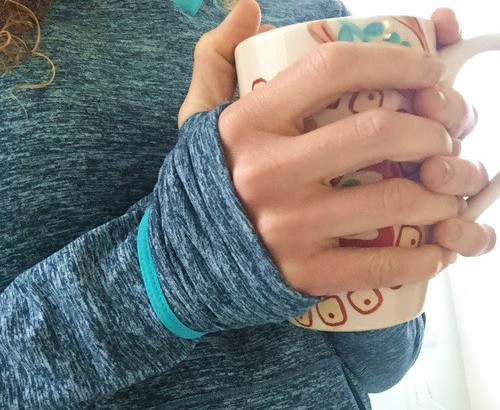Not gonna lie. I love caffeine, and when I learned years ago that caffeine could actually improve exercise, I jumped at the chance to add it to my morning routine. I’m an avid self-tracker and I log all of my exercise, including every single run I take. Because I am so clearly not a natural runner, I rely on tracking to help me gauge what helps or hinders my performance. I log quantitative metrics such as distance, pace, heart rate, etc, gathered from various apps & devices I use to aid me, and I log qualitative notes after each run about whether I had caffeine or a particular food beforehand, how much energy I had or if I felt lethargic that day, and what hurt or didn’t hurt. My notes and experience definitively reinforce what the studies say. I perform better – I enjoy running more, period – when I am caffeinated. But the why is surprising.
Caffeine & Endurance
The benefits of caffeine on endurance sports have been well established for several decades.
- Caffeine increases endurance
- Caffeine improves performance, speed, and power for endurance-related exercises (like cardio, cycling, running, swimming etc)
- Caffeine makes exercise feel easier by
- staving off fatigue
- lessening feelings of physical discomfort
Caffeine & Strength
Caffeine’s benefits with regard to strength training were somewhat less clear in early research, however a recent European study found that caffeine also aids in strength training.
- Caffeine enhances performance in resistance exercise (in this study, this meant reps to the point of failure)3
- Caffeine reduces perceived exertion & pain in resistance exercise
Caffeine & the Brain
The benefits of caffeine exceed just the physical realm.
- Caffeine is a stimulant that
- inhibits fatigue
- increases alertness, focus, vigilance and energy; that in part is why it is so useful to our sleepy morning brains
- Caffeine has been shown to improve mental performance and slow age-related mental decline7
- Caffeine can have positive effects on long-term memory9
The Gotchas
Caffeine clearly has great benefits to both the mind and the body, but like everything else, it’s best enjoyed in moderation.
- Caffeine disrupts sleep
- Some studies suggest caffeine should be avoided for at least 6 hours before bed.
- Caffeine is slightly addictive
- you can build up a tolerance to it and experience withdrawal if you cut back
When and How Much Caffeine Should You Have before Exercise
- Ideal time to ingest is about 1 hour before a workout. But if that’s within 6 hours of bedtime, you may want to skip it.
- Caffeine helps with morning alertness, so if caffeine helps you get that morning workout done at whatever ungodly hour, that’s another win.
- There are no negative side effects associated with caffeine before exercise. However, many endurance activities themselves can cause dehydration & intestinal distress (think marathon…), so caffeine can exacerbate those conditions potentially.
- Most research studies used a lot of caffeine on participants (3-5 cups of coffee’s worth), so the effects aren’t going to be as dramatic with 1 cup of pre-workout coffee, but the benefits still exist even at smaller doses.
- Your general tolerance for caffeine is a good indicator for whether you should consider using it before exercise.
Study Excerpts
“Caffeine improves sustained attention, vigilance, and reduces symptoms of fatigue. Other aspects that are localized in the [Central Nervous System] are a reduction in skeletal muscle pain and force sensation, leading to a reduction in perception of effort during exercise and therefore influencing the motivational factors to sustain effort during exercise.2
Caffeine can “permit the athlete to train at a greater power output and/or to train longer”1
Why Caffeine Works: The Equation
Wrapping Up
Caffeine can boost your exercise performance, both for endurance and strength training.
At the end of the day, you should experiment and see what works best for you. Each of us has an inner chemistry that’s a little bit unique. The guidelines above should give you a sound basis for finding ways to use caffeine to effectively enhance your exercise.
Do you use caffeine to boost your exercise performance? Which kind of exercise? Leave us a comment!
References:
- [1] Graham, 2001, “Caffeine and exercise: metabolism, endurance and performance.”, http://www.ncbi.nlm.nih.gov/pubmed/11583104
- [2] Meeusen, Roelands, Spriet, “Caffeine, Exercise, and the Brain”, Limits of Human Endurance,
https://books.google.com/books?hl=en&l… - [3] Duncan, Stanley, Parkhouse, Cook & Smith, 2013, “Acute caffeine ingestion enhances strength performance and reduces perceived exertion and muscle pain perception during resistance exercise”, European Journal of Sport Science, http://www.tandfonline.com/doi/abs/10.1080/17461391.2011.635811
- [4] Spriet, L.L, and Graham, T.E, “Caffeine and Exercise Performance”, http://www.gssiweb.org/Article/sse-60-caffeine-and-exercise-performance
- [5] Jenkins, 1995, “Caffeine and the athlete”, http://www.rice.edu/~jenky/sports/caffeine.html
- [6] Food Insight, 2015, “Fact Sheet: Caffeine and Performance”, International Food Information Council Foundation, http://www.foodinsight.org/articles/fact-sheet-caffeine-and-performance
- [7] Watson,S., 2014, “Caffeine and a healthy diet may boost memory, thinking skills; alcohol’s effect uncertain”, Harvard Women’s Health Watch
http://www.health.harvard.edu/blog/caffeine-healthy-diet-may-boost-memory-thinking-skills-alcohols-effect-uncertain-201406187219 - [8] McGill University, “How Drugs Affect NeuroTransmitters”, The Brain from Top To Bottom, http://thebrain.mcgill.ca/flash/i/i_03/i_03_m/i_03_m_par/i_03_m_par_cafeine.html
- [9] Gatlin, L., “Caffeine has positive effect on memory, Johns Hopkins researchers say”, http://hub.jhu.edu/2014/01/12/caffeine-enhances-memory
- [10] Drake C; Roehrs T; Shambroom J; Roth T., 2013, “Caffeine effects on sleep taken 0, 3, or 6 hours before going to bed”, J Clin Sleep Med, http://www.aasmnet.org/jcsm/ViewAbstract.aspx?pid=29198


very informative & well described article, helped me a lot.